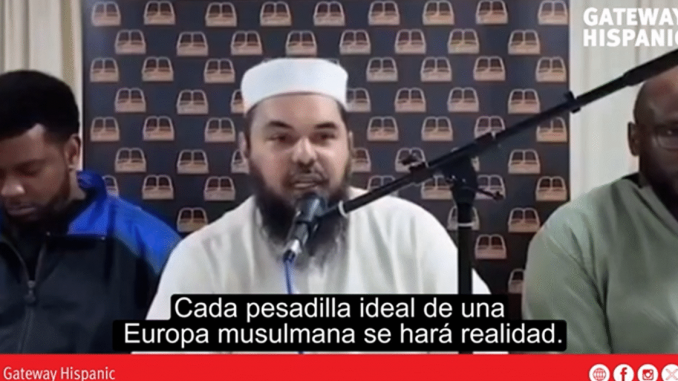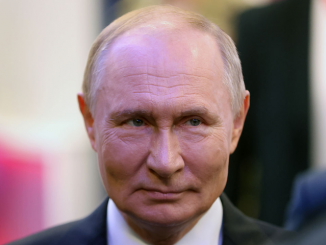
Published October 3, 2025
When California-based Imam Uthman ibn Farooq recently declared that Islam would one day dominate the globe, his words reverberated far beyond his mosque. In a fiery sermon, the imam proclaimed that “the United States will be a Muslim country, Russia will be a Muslim country, and Islam will enter every home.” He urged his audience to stand firm in their faith, never apologize for their beliefs, and remain committed to spreading Islam’s message.
The speech, captured on video and circulated online, quickly drew attention from political commentators, community leaders, and everyday Americans. For some, his remarks represented little more than a theological aspiration — a religious vision of Islam’s eventual triumph. For others, however, they sounded like a warning of ideological expansion, carrying political undertones that reached far beyond spiritual conviction.
Reactions varied widely. Civil rights advocates stressed that the majority of Muslims in the United States seek to live peacefully within democratic society, warning that the imam’s words could be misinterpreted and used to fuel anti-Muslim sentiment. At the same time, conservative commentators seized on the statement as evidence of cultural and political ambitions embedded within radical interpretations of Islam.
The viral spread of the sermon underscored how quickly religious rhetoric can become political fuel in a polarized era. While some communities doubled down on interfaith outreach, others raised alarms about the future of Western values and national identity. What began as a local sermon in California thus became a flashpoint in a much larger conversation about faith, freedom, and the struggle over cultural direction in the 21st century.
 Public / Political Reactions
Public / Political Reactions
When a religious leader expresses sweeping claims about Islam taking over or converting non-Muslim-majority nations, these are the kinds of responses that typically happen.
1. Muslim Community Leaders / Civil Rights Organizations
-
Condemnation or distancing if the rhetoric is viewed as extreme or potentially harmful. They may argue that such statements misrepresent mainstream Islam and could fuel Islamophobia.
-
Calls for clarification or context, asking the speaker to explain whether the statements are metaphorical, theological in nature, or intended as literal prophecy or political ambition.
-
Concern about blowback and safety: Many times, such remarks lead to fear among Muslim communities that they will be further stigmatized or targeted, especially given rising incidents of hate crimes, mosque vandalism, etc. (As has been reported in California and Texas after vandalism of mosques.
2. Political Figures (Local, State, National)
-
Moderate / liberal politicians often issue statements reaffirming freedom of religion but also emphasizing that no one should promote hate or threats, and that the rule of law and civil rights must be protected.
-
Law enforcement / justice departments may respond if the rhetoric is perceived as incitement, or if there’s concern about hate crimes arising as reactions. For example, in California, the AG’s office has convened interfaith leaders and law enforcement in the past to condemn “Islamophobic and xenophobic rhetoric” and emphasized legal protections for Muslim communities.
-
Conservative or right-wing figures may use these kinds of statements to support their own narratives about “threats” from Islam or immigration, sometimes amplifying the rhetoric.
3. Media & Public Opinion
-
Media coverage usually splits: some outlets criticize the remarks as alarmist or extremist; others might present them directly and allow commentators to interpret.
-
Social media often amplifies both sides: those who agree and cheer (“yes, this is speaking truth”) and those who condemn such rhetoric as incendiary, bigoted, or dangerous.
4. Interfaith and Community Coalitions
-
These often respond by promoting dialogue, urging for responsible speech, and emphasizing religious harmony. They may issue joint statements that religious freedom must include tolerance of religious diversity, protecting minority rights, etc.
Case Examples / Precedents in California
Here are a few instances that show how reactions have unfolded in California, which may serve as a mirror for responses to statements like those in the article.
-
California Attorney General Kamala Harris convened interfaith, community, and law‐enforcement leaders to condemn “Islamophobic and xenophobic rhetoric” and to address hate crimes. This shows that state officials take seriously rhetoric perceived as targeting Muslims.
-
CAIR-SFBA (Council on American-Islamic Relations, San Francisco Bay Area) has regularly responded to incidents of harassment, vandalism, or hostile speech directed at Muslims, calling for investigations, legal protections, and community awareness.
Likely / Hypothetical Reactions to the Imam’s Statement
Based on the above patterns, if an imam in California issued the statement described (“Europe, US, Russia will become Muslim nations,” etc.), one might expect the following:
-
Local Muslim organizations might issue statements clarifying that while conversion and religious belief are part of Islamic theology, calling for political Islamization of non-Muslim societies can be interpreted as provocative and may not represent mainstream beliefs.
-
Civil rights groups may express concern that the statement could foster Islamophobia, or be used to justify anti-Muslim discrimination. They might also caution against conflating extremist rhetoric with the broader Muslim population.
-
Elected officials might be split:
-
Some will denounce extremist speech and reassure Muslim constituents of their safety and equal rights.
-
Others (especially those with more conservative or security‐focused platforms) could criticize the rhetoric as evidence of a “clash of civilizations” or reinforce narratives that Islam is a threat domestically or globally.
-
-
Law enforcement / policymakers may monitor whether such rhetoric crosses legal boundaries (e.g., incitement to violence, hate speech), though U.S. legal protections for religious speech are quite broad. If no overt incitement is present, legal responses are less likely, but political pressure and media scrutiny could intensify.
-
Media debate would likely center on: freedom of religious speech vs. danger of extremist rhetoric; demography vs. ideology; and what the imam’s claims actually mean (metaphor? ideological aspiration? prophecy? political ambition?).
 Resulting Effects
Resulting Effects
1. Amplification as Proof of Threat
-
Right-leaning commentators and outlets often highlight such statements as evidence of what they have been warning about: that Islam is not merely a religion, but in some cases an ideology with political ambitions.
-
The imam’s claim that “the U.S. will be a Muslim country, Russia will be a Muslim country, and Islam will enter every home” would be used to reinforce narratives about cultural takeover, unchecked immigration, and the dangers of political Islam.
Effect: Fuels talking points about immigration restrictions, border security, and vigilance against foreign ideologies.
2. Strengthening Calls for Policy Action
-
Politicians on the right could point to remarks like these when justifying:
-
Tighter immigration policies (especially from Muslim-majority nations).
-
Surveillance and vetting of religious leaders or organizations tied to perceived radical ideologies.
-
Opposition to refugee resettlement programs, framed as a matter of “cultural preservation” or “national security.”
-
Effect: Provides rhetorical ammunition for stricter laws and executive actions.
3. Mobilization of Grassroots & Cultural Pushback
-
Right-leaning grassroots groups (patriot movements, religious conservatives, anti-immigration coalitions) often respond by warning their supporters that “Western values are under siege.”
-
Statements like the imam’s become viral snippets in social media echo chambers, generating outrage and calls for activism (rallies, petitions, support for candidates promising to “defend America’s heritage”).
Effect: Strengthens cultural identity politics — “Christian America” vs. “Islamization.”
4. Erosion of Interfaith Trust
-
Right-leaning communities may grow more skeptical of interfaith initiatives, viewing them as a form of “soft entry” for Islamization.
-
This can strain community relations, particularly in states like California where interfaith dialogue is relatively common.
Effect: Heightens polarization, widens the “us vs. them” divide, and fosters suspicion toward local mosques or Muslim leaders — even if they have no connection to the imam’s rhetoric.
5. Media Echo Effect
-
Conservative media (Fox, Newsmax, talk radio, podcasts) are likely to spotlight the imam’s words, often replaying the most provocative soundbites.
-
These reports tend to frame the imam as speaking “openly what others think quietly,” using his statements as proof that Islamization isn’t a conspiracy theory, but an admitted goal.
Effect: Keeps the story alive longer, shapes audience perceptions, and cements Islamization as a political buzzword.
6. Political Weaponization in Campaigns
-
During election cycles, right-leaning candidates might use such stories in speeches, ads, or debates to argue:
-
That “weak leadership” has allowed ideological infiltration.
-
That progressives ignore or downplay threats.
-
That only strong, conservative leadership will protect national identity.
-
Effect: Electoral leverage — energizing the base around nationalism, religious values, and security.
 Future Outlook
Future Outlook
Looking ahead, the controversy over global Islamization rhetoric is unlikely to fade quickly. In fact, its long-term impact may rest less on the imam’s specific words than on how different groups interpret and weaponize them.
-
Heightened Polarization
The divide between right-leaning and left-leaning responses will likely deepen. Conservatives will continue to highlight such statements as evidence of ideological threats, while progressives and civil rights advocates will focus on combating Islamophobia and protecting religious freedoms. -
Policy Pressure
Expect renewed calls from the right for stricter immigration controls, enhanced vetting of religious leaders, and monitoring of foreign-funded religious institutions. These demands may find political traction in states already leaning toward tougher security measures. -
Media & Campaign Use
As elections approach, candidates and commentators are likely to resurface this story (and similar ones) as proof points in broader debates about national identity, religious influence, and cultural resilience. Short video clips or soundbites from the imam will circulate widely, especially in right-leaning media ecosystems. -
Community Impact
Muslim communities in California and beyond may face greater scrutiny, with interfaith groups forced to work harder to maintain trust. At the same time, younger Muslims may feel pressure to clarify their faith’s stance on politics versus personal belief. -
Global Context
Internationally, rhetoric of global Islamization will continue to resonate in parts of the Muslim world, especially among groups that view the spread of Islam as both a spiritual and political mission. This could feed into broader geopolitical narratives where religion and politics are intertwined.
 Bottom Line:
Bottom Line:
The California imam’s sweeping claim that Islam will one day dominate nations like the United States, Europe, and Russia sparked more than theological debate — it ignited cultural and political ripples across the spectrum. For critics, particularly on the right, his remarks reinforced long-standing fears of ideological takeover, serving as fresh evidence to justify tighter immigration, stricter security policies, and a renewed defense of Western identity. For civil rights advocates and Muslim community leaders, however, the speech raised concerns of backlash, Islamophobia, and the misrepresentation of mainstream Islam.
The broader effect is a sharpening of fault lines: right-leaning groups become more vigilant and mobilized around “defending tradition,” while Muslim organizations and progressive voices rally to safeguard religious freedom and resist stereotyping. In this cycle of reaction and counterreaction, the imam’s words function less as prophecy and more as a catalyst — fueling media narratives, political campaigns, and cultural anxieties on both sides.
Ultimately, whether taken as literal aspiration, rhetorical flourish, or religious vision, the statement underscores how powerful language can be in shaping perception, amplifying divisions, and influencing both public opinion and political agendas in today’s polarized climate.
SOURCES: THE GATEWAY HISPANIC – California Imam Warns of Alleged Global Islamization





Be the first to comment